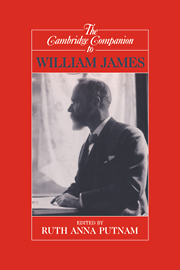Book contents
- Frontmatter
- Introduction
- 1 Pragmatism and introspective psychology
- 2 Consciousness as a pragmatist views it
- 3 John Dewey's naturalization of William James
- 4 James, Clifford, and the scientific conscience
- 5 Religious faith, intellectual responsibility, and romance
- 6 The breathtaking intimacy of the material world
- 7 James, aboutness, and his British critics
- 8 Logical principles and philosophical attitudes
- 9 James's theory of truth
- 10 The James/Royce dispute and the development of Jarnests "solution"
- 11 William James on religious experience
- 12 Interpreting the universe after a social analogy
- 13 Moral philosophy and the development of morality
- 14 Some of life's ideals
- 15 “A shelter of the mind”
- 16 The influence of William James on American culture
- 17 Pragmatism, politics, and the corridor
- 18 James and the Kantian tradition
- Bibliography
- Index
10 - The James/Royce dispute and the development of Jarnests "solution"
Published online by Cambridge University Press: 28 May 2006
- Frontmatter
- Introduction
- 1 Pragmatism and introspective psychology
- 2 Consciousness as a pragmatist views it
- 3 John Dewey's naturalization of William James
- 4 James, Clifford, and the scientific conscience
- 5 Religious faith, intellectual responsibility, and romance
- 6 The breathtaking intimacy of the material world
- 7 James, aboutness, and his British critics
- 8 Logical principles and philosophical attitudes
- 9 James's theory of truth
- 10 The James/Royce dispute and the development of Jarnests "solution"
- 11 William James on religious experience
- 12 Interpreting the universe after a social analogy
- 13 Moral philosophy and the development of morality
- 14 Some of life's ideals
- 15 “A shelter of the mind”
- 16 The influence of William James on American culture
- 17 Pragmatism, politics, and the corridor
- 18 James and the Kantian tradition
- Bibliography
- Index
Summary
In philosophy we have a . . . contrast expressed in the terms “empiricist” and “rationalist”. . . . The world of concrete personal experiences to which the street belongs is multitudinous beyond imagination, tangled, muddy, painful and perplexed. The world to which your philosophy professor introduces you is simple, clean and noble. . . . It is at this point that my own solution begins to appear. I offer the oddly-named thing pragmatism as a philosophy that can satisfy both kinds of demand.
In a 1900 letter to his colleague - and life-long philosophical interlocutor - Josiah Royce, James confesses: [W]hen I write, 'tis with one eye on you, and one on the page. . . . I lead a parasitic life upon you, for my highest flight of ambitious ideality is to become your conqueror, and go down into history as such . . . in one last death-grapple of an embrace” (Sel. Letters, 192). Indeed, it is arguably the case that much of what James has to say concerning a host of philosophical topics is written with an anxious eye on his ongoing public philosophical debate with Royce. This essay is concerned with one such topic.
- Type
- Chapter
- Information
- The Cambridge Companion to William James , pp. 186 - 213Publisher: Cambridge University PressPrint publication year: 1997
- 5
- Cited by

